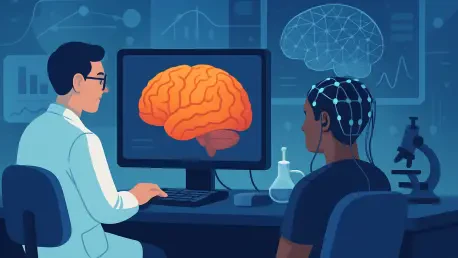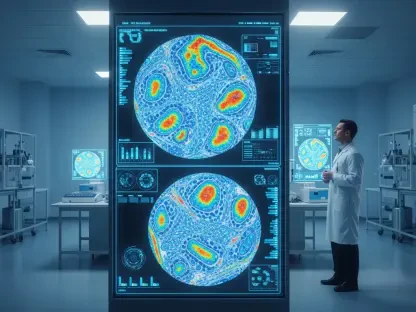In a groundbreaking stride for neuroscience, the Allen Institute for Brain Science has unveiled the Brain Knowledge Platform (BKP), a pioneering digital database that promises to redefine how the global scientific community approaches brain research. Loaded with data from over 34 million brain cells, this innovative tool addresses the persistent challenges of fragmented datasets and inconsistent terminologies that have long hindered progress in the field. By creating a unified, searchable map of brain information, the BKP fosters seamless collaboration among researchers worldwide, driving a collective mission to uncover the intricacies of the brain and develop treatments for debilitating conditions such as Alzheimer’s and Parkinson’s. Supported by major players like the National Institutes of Health’s BRAIN Initiative, alongside technology leaders like Amazon Web Services and Google, this platform stands as a beacon of hope for accelerating discoveries. It’s not just a repository—it’s a transformative force aimed at uniting isolated efforts into a cohesive, impactful endeavor that could reshape the future of brain health.
Transforming the Landscape of Neuroscience Collaboration
The essence of the BKP lies in its ability to break down the barriers that have historically isolated neuroscience research. For too long, scientists across different regions and institutions have operated in silos, using varied methods, technologies, and classifications that made sharing insights nearly impossible. This platform centralizes an immense array of data, from single-cell analyses to spatial transcriptomics, into a harmonized environment. Such unification means that a researcher in Tokyo can directly build upon findings from a lab in New York without the friction of mismatched terminologies or incompatible datasets. This collaborative spirit, reminiscent of landmark projects like the Human Genome Project, provides a shared framework that could dramatically speed up the decoding of the brain’s complex architecture, paving the way for collective advancements.
Moreover, the collaborative power of the BKP extends beyond mere data sharing to fostering a truly global scientific dialogue. By standardizing information into a common language, it ensures that researchers speak the same scientific tongue, regardless of their geographic or institutional boundaries. This isn’t just about access—it’s about creating a community where ideas and discoveries flow freely, unhindered by technical discrepancies. The platform’s open-access nature further democratizes knowledge, allowing smaller labs or those with limited resources to tap into the same wealth of information as major research centers. As a result, the potential for innovation multiplies, as diverse perspectives converge on solving some of the most pressing challenges in understanding brain function and combating neurological disorders.
Leveraging Advanced Technology for Deeper Insights
At the heart of the BKP’s revolutionary approach is its integration of cutting-edge technology, particularly artificial intelligence (AI), to enhance the analysis of vast neuroscience datasets. AI algorithms embedded within the platform enable scientists to detect subtle patterns and connections that might otherwise remain hidden in the sheer volume of data. For instance, comparing the behavior of brain cells in healthy versus diseased states becomes more precise, potentially revealing critical insights into the mechanisms of disorders like Alzheimer’s. Additionally, natural language processing features allow users to search for specific molecules or cell characteristics through intuitive queries, making the platform accessible even to those less versed in technical data navigation.
Beyond AI, the technological backbone of the BKP is bolstered by partnerships with industry giants who have crafted a robust computing infrastructure to support its ambitious goals. This infrastructure ensures that the platform can handle the immense data loads and complex computations required for modern brain research. Such technological synergy exemplifies the growing intersection of biology and digital innovation, positioning the BKP as a model for how science can harness tech advancements to tackle intricate biological questions. The result is a tool that not only stores information but actively transforms it into actionable knowledge, empowering researchers to push the boundaries of what’s possible in neuroscience with unprecedented efficiency and precision.
Translating Research into Tangible Medical Advances
One of the most compelling aspects of the BKP is its direct focus on bridging the gap between laboratory research and real-world medical solutions. By incorporating data from both healthy and diseased brains, the platform enables scientists to pinpoint specific cell types affected by neurological conditions. This targeted approach allows for the testing of potential treatments on these exact cells, streamlining the often lengthy process of drug development. Furthermore, the inclusion of a catalog of genetic tools within the platform means researchers can immediately act on their findings, obtaining the necessary resources to conduct experiments without delay, thus accelerating the journey from hypothesis to clinical application.
Equally significant is the platform’s potential to impact patient outcomes by fostering a more direct connection between basic science and therapeutic innovation. As researchers identify the cellular underpinnings of diseases like Parkinson’s, they can tailor interventions with greater specificity, potentially leading to therapies that are both more effective and less invasive. This focus on practical application underscores the BKP’s role not just as a repository of knowledge, but as a catalyst for tangible health benefits. By reducing the time and barriers between discovery and treatment, it offers a renewed sense of urgency and hope for millions affected by brain disorders, marking a significant step forward in the quest for cures.
Enhancing Research Efficiency and Systemic Understanding
Efficiency stands as a cornerstone of the BKP’s value, addressing the critical issue of redundancy in neuroscience research. By connecting existing studies and making them discoverable within a unified system, the platform ensures that scientists don’t waste resources replicating work already completed. Instead, they can channel their efforts into unexplored areas, focusing on novel breakthroughs rather than rediscovering known information. This interconnectedness also reveals unexpected links between different brain conditions, opening new research pathways that might have otherwise gone unnoticed, and fostering a more comprehensive understanding of the brain as an integrated system.
Additionally, the BKP’s design promotes a deeper, systems-level perspective that enhances experimental planning and scientific inquiry. Researchers gain access to layered information about brain cell types, akin to adding detailed topography to a basic map, which guides more informed and strategic study designs. This holistic view not only saves time but also amplifies the potential for groundbreaking insights by highlighting connections across diverse datasets. As a result, the platform serves as a vital tool in past efforts to unify fragmented research, setting a precedent for future initiatives to build upon its foundation and continue driving progress in unraveling the brain’s mysteries.
Paving the Path for Future Neuroscience Innovations
Reflecting on the strides made by the BKP, it’s clear that its launch marks a turning point in how neuroscience tackles longstanding challenges. Looking ahead, the platform’s framework offers a blueprint for ongoing and future collaborations, encouraging the scientific community to expand its datasets and refine its tools. Stakeholders should prioritize integrating emerging technologies and broadening access to ensure that even more researchers can contribute to and benefit from this shared resource. By continuing to invest in such unified platforms, the field can sustain the momentum of past achievements, driving toward a deeper understanding of brain health and more effective treatments for neurological diseases.









